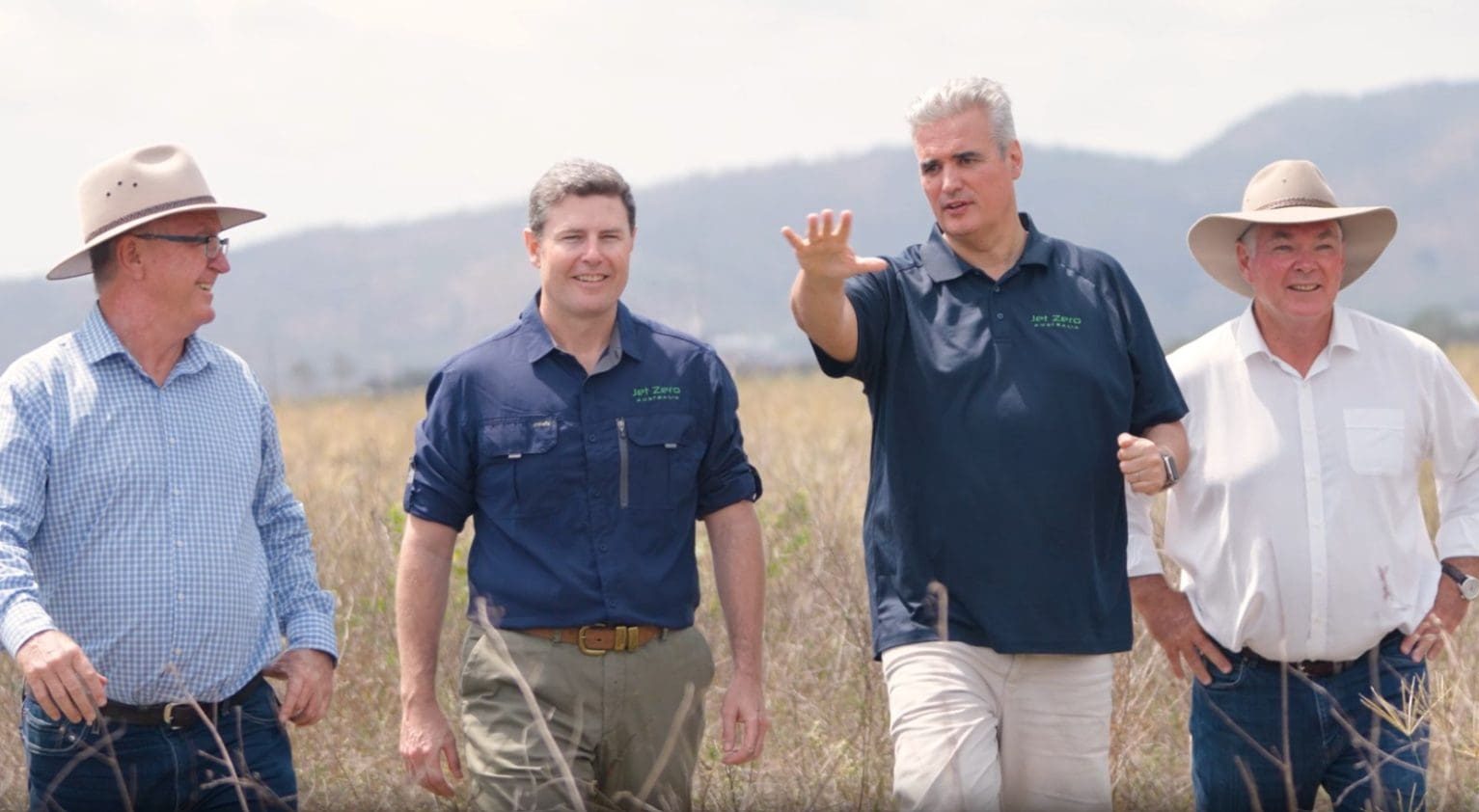
Jet Zero Australia’s Jonathon Flegg and Ed Mason (centre) with Les Walker MP and Scott Stewart MP at the site of the future SAF production facility in Townsville. Photo: Jet Zero Australia
AUSTRALIA’S first alcohol-to-jet renewable fuels facility is one step closer after Jet Zero Australia was awarded $14 million in Queensland and Federal government funding to advance its Townsville-based Project Ulysses.
The funding will bring Project Ulysses through the front-end-engineering-design (FEED) stage into final investment decision (FID).
The project will turn agricultural waste into ethanol and convert it into jet fuel, and it is anticipated the facility will be able to produce approximately 110 million litres of low-carbon liquid fuels such as SAF and renewable diesel each year.
Jet Zero Australia has formed a consortium of partners to support delivery of the project with the technology to be supplied by LanzaJet, with Qantas, Airbus, and Idemitsu Kosan among the key investors.
Through the Australian Renewable Energy Agency (ARENA), the Federal Government has committed $9M, with the Qld Government contributing an additional $5M through the Queensland New-Industry Development Strategy (QNIDS) to grow local production capabilities and establish SAF value chains.
The project’s FEED activities are due for completion in 2025.
Jet Zero Australia CEO Ed Mason said the project is targeting to commence production by 2027.
“Delivering Project Ulysses will help capture the economic benefits of a domestic SAF industry for Australia which is expected to be worth $10 billion annually and create up to 26,200 jobs nationwide by 2030, with regional Australia positioned more than anywhere to benefit,” Mr Mason said.
“The grant announcements today build on an early $760,000 grant received by Jet Zero from the Department of State Development and Infrastructure that supported the project’s initial feasibility study.
“The project will also contribute to domestic energy security by bolstering domestic jet fuel production for civilian and potentially military aircraft in an important city like Townsville.”
Based on initial modelling, the Townsville plant could cut net domestic aviation carbon emissions by 70 percent compared to conventional fossil-fuel use, displacing up to 225,000 tonnes of CO2 annually.
Domestic aviation accounts for about 2pc of Australia’s greenhouse gas emissions and is viewed as a hard-to-abate sector, with the bulk of emissions from medium to long-haul flights.
Federal Minister for Climate Change and Energy Chris Bowen said the government had committed $30M through ARENA to invest in SAF projects.
“It is great to see that investment starting to pay dividends,” Mr Bowen said.
Queensland Minister for State Development and Infrastructure Grace Grace said the SAF industry could provide significant jobs and investment for the state.
“We know that our investment in SAF will help to deliver significant economic benefits for Queensland, including more jobs and more investment.
“We’re already funding a feasibility study into the new Wagner SAF Refinery as well as Energreen’s new processing facility in Central Queensland, which aims to grow SAF feedstock, and we will continue to build on these investments through our Queensland New ‑Industry Development Strategy.”
According to ARENA’s Bioenergy Roadmap, by 2030 a domestic SAF industry could be worth $10 billion in extra annual GDP and could create up to 26,200 jobs, with regional Australia positioned to receive most of those new jobs where SAF production is derived from domestic agricultural feedstocks.
ARENA CEO Darren Miller said the organisation would be “taking an active role” to ensure the lessons from Jet Zero Australia’s project can inform further SAF work.
“With abundant feedstocks and vast renewable energy resources, Australia is well placed to produce the sustainable aviation fuels we need, right here at home,” Mr Miller said.
Source: Jet Zero, Australian Government, ARENA

HAVE YOUR SAY